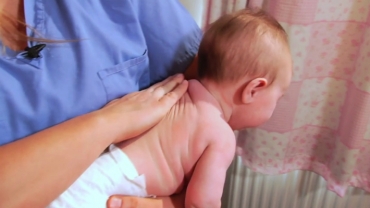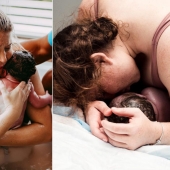En caul birth, sometimes referred to as a veiled birth, is when a baby is birthed still inside an intact amniotic sac. This may give the appearance your baby is born in a clear, soft bubble. A bit like a water balloon.
Once the baby has been born, the midwife or mum will gently tear open the amniotic sac and remove baby from their membranes.
Caesarean en caul births are known to happen yet a vaginal en caul birth occurs spontaneously and is thought to be more rare.
En caul birth is very rare. Some estimate it is believed en caul births would be 1% to 2% of all vaginal deliveries if there were no membranes that were artificially ruptured. This amounts to less than one in 80,000 births. So it’s even more rare in a system that can’t help but interfere….
Babies born ‘en caul’ are thought to be extremely lucky babies. Superstition led sailors to carry the caul (membranes) of such babies to protect them at sea, as it is said an en caul baby will never drown.
In many cultures, an en caul birth is considered very auspicious and means that your child is destined for greatness.
Throughout history, en caul births have been attributed with fame and fortune, even magical and spiritual abilities. In many parts of Europe, the amniotic sac, or “caul” itself held such special fortune, that it was often sold as a token of good luck and protection.
It was provided to lawyers, needing good fortune in pleading their cases and even as an ingredient in love potions. In Old Nordic beliefs a child born en caul was said to have the special ability to navigate between many worlds and see into the future.
As early as the 16th century, some physicians, finding a simple biological explanation, began to scorn any superstitious beliefs associated with en caul births.













